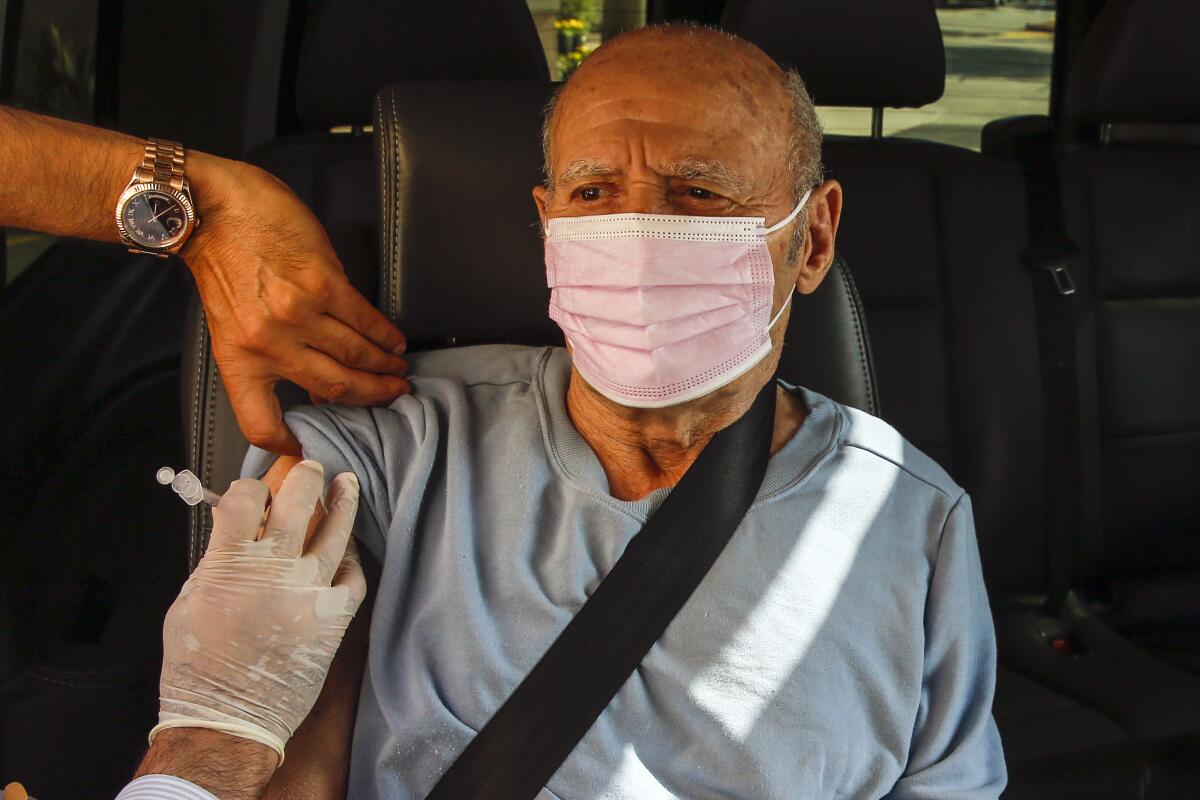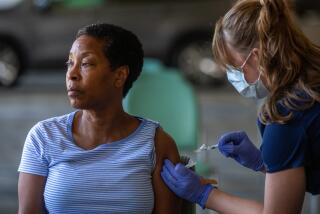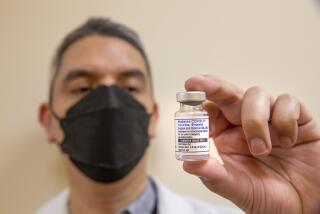Confusion reigns over who is eligible for boosters, prompting California to take action

- Share via
With confusion mounting over who is eligible for COVID-19 booster shots, California health officials updated the state’s guidelines Tuesday to say that essentially all adults are recommended to get the additional vaccinations.
The move by the California Department of Public Health could be a precursor to federal officials taking similar action by the end of this week. There is increasing expectation that the U.S. Food and Drug Administration and U.S. Centers for Disease Control and Prevention will officially make booster shots available to all fully vaccinated adults, as long as enough time has passed since receiving their initial vaccination series.
California’s move echoes recent efforts undertaken in places such as New York City, Colorado and New Mexico, as some health officials nationwide have voiced alarm at the sluggish booster uptake and expressed worry about a potential fifth COVID-19 surge that could strike this winter. Average daily coronavirus cases nationwide have risen by 14% over the last week, and average new daily COVID-19 hospital admissions are up by 5%.
The problem, some experts say, has been an overly complicated set of guidelines issued by the CDC weeks ago on who are eligible for boosters. Some experts say they have been so confusing that many people who most need those extra shots — the elderly and those with chronic medical conditions — haven’t gotten them.
Some have hit roadblocks in their efforts to get boosters. Others have found it difficult to square the state’s stance with the seemingly stricter federal guidelines still listed on the websites of many pharmacies operated by national chains.
The complex messaging led California to embark on its clearest effort yet to clear up confusion on who should get the booster shots. As Gov. Gavin Newsom announced at a news conference Tuesday in Kings County in the San Joaquin Valley, one of the least-vaccinated areas of the state, “Anyone who wants a booster can get a booster shot.”
“If you have been vaccinated, and it’s been six months, now you can get a booster shot [if you’re] 18 and over,” Newsom told reporters at Avenal High School.
“This virus, this disease is not taking the winter off,” the governor added. “Boosters are important to deal with waning immunity and important to help us get through this winter.”
But it could take several more days before federal agencies revise their guidelines and there’s widespread easing of the confusion over booster eligibility.
The state’s new recommendations came a week after the state health officer and director of public health, Dr. Tomás Aragón, directed vaccine clinics in a letter to not turn away any adult patients seeking a booster, as long as at least two months have passed since they received a Johnson & Johnson vaccine or they’re six months removed from their second dose of either Pfizer-BioNTech or Moderna.
That led some counties — including Los Angeles, Ventura, San Francisco and Santa Clara — to update their local guidelines to make clear just how readily available boosters truly are. But others have not, and it remains unclear how many residents are aware of the changes.
Bria Dotson of Encino entered the Balboa Sports Complex on Tuesday afternoon not knowing whether she would be able to receive the booster.
“If they turn me away, I’ll just schedule it,” said Dotson, who was seeking the additional dose because she works around others in an office five days a week.
For many, the stumbling block is the criteria listed to qualify for a booster shot when trying to book an appointment. Some have said they don’t qualify for any of the categories.
California’s MyTurn.ca.gov website, for instance, as of Tuesday night still asked whether someone looking to schedule an appointment is a resident of a long-term care facility like a nursing home, at high risk for COVID-19 complications, at high risk for COVID-19 exposure due to occupation or institutional setting or at increased risk of social inequities.
If people answer “no,” the website says they’re not currently eligible.
However, there’s one category for which virtually all adults qualified, according to the permissive interpretation articulated recently by health officials across California.
Under this interpretation, essentially all adults were eligible because they were “at high risk for COVID-19 exposure due to occupation or institutional setting.”
For some, this initially appeared at odds with the guidance handed down by the CDC.
For weeks, the CDC has said that — among people who got the Pfizer-BioNTech and Moderna shots — those eligible for a booster included adults “who work or live in high-risk settings,” such as schools, hospitals, grocery stores, factories and jails.
But the CDC also pointedly allows vaccinated adults to use their own judgment in determining whether they think they’re at increased risk of exposure.
It’s this interpretation that a number of states and local governments zeroed in on as they urged all fully vaccinated adults to get a booster shot as soon as possible.
As a result, some health officials are essentially saying to people who want a booster shot: If you’re asked by a pharmacy or vaccine clinic if you’re at high risk of COVID-19 exposure due to occupational or institutional setting, say yes, and you’ll get the vaccine.
Still, it would be much easier for patients to get vaccines without that kind of hassle, and some vaccine providers and appointment schedulers are already working on updating their eligibility language to be consistent with the new, simple wording released by the state Tuesday.
The state said it is in the process of updating the criteria listed on its MyTurn appointment scheduling tool. A representative from Ralphs said the company is working on revisions in light of California’s new recommendations.
The COVID-19 vaccine scheduling site for Albertsons — which also operates Vons, Pavilions and Safeway — was updated Wednesday morning to account for California’s latest eligibility wording.
CVS, on the other hand, does not have immediate plans to change its wording to reflect California’s newest recommendation. “Our participation in the federal pharmacy program requires us to follow recommendations from the FDA and CDC,” said CVS spokeswoman Monica Prinzing.
A Walgreens spokesperson did not say whether the chain would change the wording of its eligibility criteria for California residents, only saying that the company will administer booster doses to “patients who attest to meeting eligibility.”
All this confusion could become settled once the federal agencies act on a new application by Pfizer to make its vaccination available as a booster to all adults.
The FDA may make its decision later this week, just before an advisory committee to the CDC meets Friday. That could set up a situation in which the agency’s director, Dr. Rochelle Walensky, could move quickly to officially widen eligibility for booster shots to all adults by this weekend.
Some epidemiologists said that expanding access to boosters to all adults is a good idea.
While younger, healthier vaccinated people are not particularly likely to become severely ill or die from a breakthrough coronavirus infection, a booster shot will help reduce the likelihood of them getting infected and passing along the coronavirus to elderly people and others at far greater risk.
“If younger people got boosted, it would help reduce transmission rates in the community,” said Dr. Robert Kim-Farley, medical epidemiologist and infectious diseases expert at the UCLA Fielding School of Public Health.
Dr. Kirsten Bibbins-Domingo, chair of UC San Francisco Department of Epidemiology and Biostatistics, said a simpler message will help spur booster shots for more people, including those that need them most.
In California, only 38% of fully vaccinated seniors ages 65 and older have received a booster. And overall, about 4.23 million people total have gotten their boosters statewide.
It’ll be especially important to get boosted “as we look to the winter months of us all getting together in indoor spaces for prolonged periods of time — without masks — with people you don’t ordinarily hang out with,” Bibbins-Domingo added.
“That’s why everyone really should be boosting,” she said. “What is clear from the most recent data is that anyone can get a breakthrough infection. And if you get a breakthrough infection, you can still pass that breakthrough infection on to someone else.”
Marcie Aboulafia, 79, of Encino received her Pfizer-BioNTech booster Tuesday morning at the Balboa Sports Complex. She had previously attempted to receive the booster at several pharmacies but to no avail.
For her, it was important to get a booster now, as she’s planning to travel to Oregon for Thanksgiving.
“I just didn’t want to leave without the booster,” she said.
Elton Velasquez, 45, of Tarzana also headed to the Balboa Sports Complex for his booster Tuesday morning. Tagging along were his 9-year-old son and 7-year-old daughter, who were set to get their first doses of the Pfizer-BioNTech vaccine.
“It’s my civic duty,” he said. “We think about other people.”
More to Read
Sign up for Essential California
The most important California stories and recommendations in your inbox every morning.
You may occasionally receive promotional content from the Los Angeles Times.













